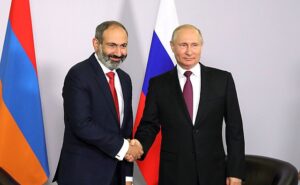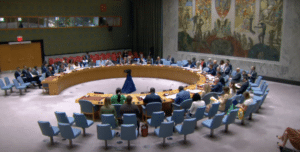Photo: Brussels hosted meeting of Aliyev and Pashinyan in August 2022 – Wikimedia Commons
A peace deal between Armenia and Azerbaijan seems close. The two would have agreed on three core principles and only details are to be discussed. However, many meetings between the countries’ leaders to potentially agree on a deal have also been cancelled and postponed so far. What is the current status of the negotiations and what is needed to help the process along?
The deal
After Azerbaijan’s attack on Nagorno-Karabakh on September 19, which led to the almost complete exodus of the ethnic Armenian population, a new deal should take the sting out of the conflict. The political settlement of the Nagorno-Karabakh region had been the issue in the peace talks that followed the devastating autumn 2020 war between both countries. Azerbaijan has now definitely gained the upper hand in the region – which allows them to set the terms for an expected peace deal. According to Armenian PM Pashinyan, three core principles have been agreed upon. Firstly, each other’s territorial integrity is recognised, with Armenia being 29,800 square kilometres and Azerbaijan being 86,600 square kilometres. The second principle is about delimitation of the border, on the basis of the Soviet Union borders, following the Alma-Ata declaration of 1991. For Azerbaijan the point of delimitation is acceptable now it has de facto reclaimed large parts of what it has always claimed as its territory. Lastly, the border should be open again and transport links and communication be restored, respecting each other’s customs jurisdictions.
Armenia’s move
In the background, Armenia has been intensifying diplomatic relations with Western states and has made clear it is not interested in a deal brokered by its traditional ally Russia. Armenia no longer appreciates Russia’s military presence, as it has proved to be unable to support the defense of Armenia. Lately, Pashinyan has passed on several CSTO and CIS summits. Although Armenia has no intention of leaving the regional organisations of ex-Soviet states yet, it exemplifies Armenia’s deteriorating relation with Russia. Azerbaijan criticises Armenia’s move away from Russia. It thinks Russia is a logical, regional country to play a role in a peace deal, more so than countries that are much further away and have no history with both countries. Armenia has signed deals with India and France, which has delivered twenty or so armoured vehicles. Armenia’s move to the west and ‘militarisation’ has also provoked anger and tension on the Azerbaijani side.
Mediator wanted
Azerbaijani president Aliyev and Pashinyan would meet on October 5 under mediation of European leaders Macron, Scholz and Michel. Aliyev backed down, arguing the presence of a biased France and the exclusion of partner Türkiye. Azerbaijan is open for talks with Armenia, but not in this composition. The countries cannot agree on who should be the mediator. Azerbaijan accuses Armenia’s proposals the US and France of being Armenia-biased, and prefers regional powers like Russia and close ally Türkiye. “We need peace in our region, not in Washington, Paris or Brussels.” Armenia, however, is no longer interested in Russia, and has a tense relationship with Türkiye. Georgia has offered to lead the peace process as it has interest in stability in the region, but neither has the capacity nor the international leverage. The process asks for the mediation of superpowers.
‘Different language’
Pashinyan has said that Azerbaijan’s lack of commitment leaves the perspective of renewed “military aggression” open, also focused on opening the Lachin Corridor to Nakhichevan by force. Azerbaijan has rejected these claims. However, Azerbaijani officials calling Armenia “Western Azerbaijan” has impeded the peace process, and seems a “preparation for a new war”, according to Armenia. The severe propaganda from Azerbaijani officials have been a serious obstacle for successful negotiations, as it has been for longer. By stalling the process, Aliyev hopes to force Pashinyan into giving in on conditions just for the sake of a deal, which is demanded by the Armenian population.
Bilateral meeting
A meeting between country officials about border delimitation will take place on November 30. This meeting should confirm if both Armenia and Azerbaijan are still agreeing to the three set principles. Eventually, the countries’ representatives will have to meet in the presence of a mediator to discuss other issues which cannot be solved in direct talks – issues relating the rights of the displaced Karabakh population for example. Both countries say they are willing to talk to each other and are offering talks, but an official meeting between Pashinyan and Aliyev is still not confirmed.
The peace process between Armenia and Azerbaijan has reached an impasse. The usual suspects to lead a peace process – EU, US, Russia – are currently sidelined due to individually set conditions by both countries. However, it is hard to ignore Russia’s (military) presence in the country which will guarantee a role for Russia in the process. For the EU, it will be key to find a position that suits all present interests, so it can play its mediation role. The importance of the regional bloc into thawing these sort of hostilities cannot be underestimated, especially now Armenia seeks further rapprochement with Brussels.
Written by Timon Driessen



